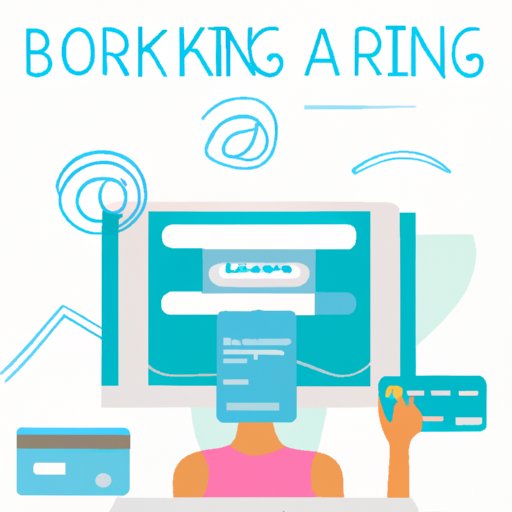Introduction
Opening a bank account online is a convenient way to manage your finances without the hassle of visiting a physical branch. With the rise of digital banking, more and more people are looking to open a bank account from the comfort of their home. This article will provide a step-by-step guide on how to open a bank account online, as well as some tips for selecting the right bank and financial institution.
Steps to Opening a Bank Account Online
The process of opening a bank account online is relatively straightforward. Here are the steps you need to take to get started.
Researching Financial Institutions
The first step in opening a bank account online is researching different financial institutions. Make sure to compare fees, interest rates, and terms & conditions when deciding which one is right for you. Additionally, it’s important to consider the types of accounts offered, customer service, and mobile app usability.
Selecting the Right Bank and Financial Institution
Once you’ve done your research, you can select the right bank and financial institution for your needs. Make sure to read through all the fine print before making your decision, as this will ensure that you’re getting the best deal possible.
Verifying Identity and Required Documents
After selecting the right bank or financial institution, you’ll need to verify your identity and submit any required documents. This usually involves submitting a valid form of identification, such as a driver’s license or passport, as well as proof of address.
Opening the Account
Once you’ve submitted all the necessary documents, you’ll be ready to open the account. This process is usually done online and should only take a few minutes. Once the account is open, you’ll be able to start using it immediately.

Advantages of Having an Online Banking Account
There are many advantages to having an online banking account. Here are a few of them.
Convenience
One of the biggest advantages of having an online banking account is convenience. You can access your account from anywhere, at any time. This makes it easy to manage your finances, pay bills, and transfer money without having to visit a physical branch.
Accessibility
Another advantage of having an online banking account is accessibility. You can easily view your account balance and transaction history, set up automatic payments, and transfer money between accounts with just a few clicks.
Security
Finally, online banking accounts are much more secure than traditional banking accounts. Most banks use advanced encryption technology to protect your data, and many offer fraud protection services to help keep your money safe.

Tips for Selecting the Right Bank and Financial Institution
When selecting the right bank and financial institution, it’s important to consider fees, interest rates, and terms & conditions. Additionally, make sure to look into the types of accounts offered, customer service, and mobile app usability.
Fees, Interest Rates, and Terms & Conditions
Make sure to thoroughly read through the fees, interest rates, and terms & conditions when choosing a bank or financial institution. These can vary significantly from one institution to another, so it’s important to do your research and find the one that best fits your needs.
Types of Accounts Offered
Different banks may offer different types of accounts, so make sure to check what types of accounts are available. For example, some banks offer savings accounts, checking accounts, and even investment accounts.
Customer Service
Finally, it’s important to consider the customer service offered by the bank or financial institution. Make sure to read reviews and ask questions to ensure that you’ll be taken care of if you ever need help.
Conclusion
Opening a bank account online is a quick and convenient way to manage your finances. This article has provided a step-by-step guide on how to open a bank account online, as well as some tips for selecting the right bank and financial institution. With the right information, you can easily open an online banking account and start taking control of your finances.
For further information, visit your local bank or financial institution, or search online for additional resources.
(Note: Is this article not meeting your expectations? Do you have knowledge or insights to share? Unlock new opportunities and expand your reach by joining our authors team. Click Registration to join us and share your expertise with our readers.)
